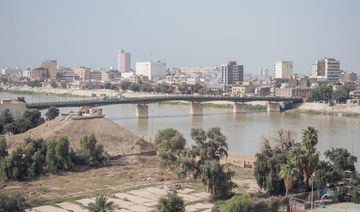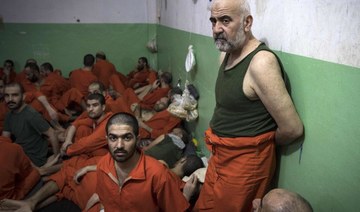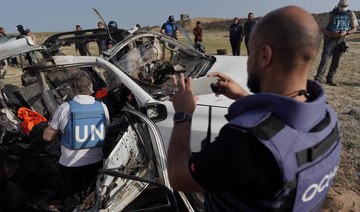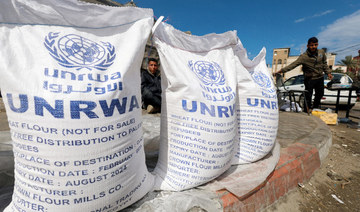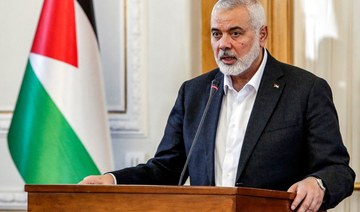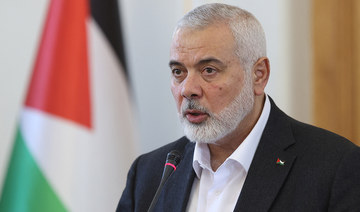HASAKEH, Syria: Daesh group on Friday attacked a Syria prison housing fellow jihadists and a military base in Iraq in near simultaneous deadly operations that revived fears of a Daesh resurgence.
The jihadist group has yet to comment on the attacks and there is no indication that they are coordinated but, according to analysts, they strongly suggest Daesh is trying to boost its ranks and arsenal in an attempt to reorganize across both countries.
In Syria, an ongoing Daesh attack on a northeast Syria detention facility holding the largest number of Daesh suspects killed at least 20 Kurdish security forces and set several Daesh fighters free, according to the Britain-based Syrian Observatory for Human Rights.
The prison break that began late Thursday was one of the group’s most significant attacks since its “caliphate” was declared defeated in the war-torn country nearly three years ago.
As Daesh operatives launched their bid to free some of the estimated 3,500 fellow fighters jailed at Ghwayran prison in the Syrian city of Hasakah, the jihadists killed 11 soldiers in an attack on an army base in the east of neighboring Iraq.
The attack marked the jihadists’ deadliest operation in Iraq this year.
While the Iraq operation quickly came under wraps, Kurdish forces in Syria continued to battle jihadists in Hasakah, hours after the prison attack began with a Daesh car bomb late Thursday, the Observatory said.
“The number of those killed among Kurdish internal security forces and prison guards stands at 20,” Observatory head Rami Abdel Rahman told AFP.
The war monitor, providing figures that were not immediately confirmed by the authorities of the autonomous Kurdish region, also said at least 16 jihadists were killed in the ongoing fighting.
The brazen Daesh operation sewed chaos in Hasakah, forcing people to flee the area around Ghwayran prison.
Daesh fighters hunkered down in homes around the facility, sometimes using residents as human shields, as Kurdish forces fought to retake full control of the neighborhood and hunt down prisoners on the loose.
Daesh has carried out regular attacks against Kurdish and regime targets in Syria since the last rump of its once-sprawling proto-state was defeated on the banks of the Euphrates in March 2019.
Most of their guerrilla attacks have been against military targets and oil installations in remote areas but the Hasakah prison break could mark a new phase in the group’s resurgence.
The Syrian Democratic Forces, the Kurds’ de-facto army in northeast Syria, said it had recaptured 89 Daesh detainees in its sweep of the area.
“Clashes continue in the vicinity of the prison,” the SDF said in a statement.
The US-led international coalition formed to battle Daesh acknowledged the attack and added that the SDF had suffered casualties but did not say how many.
Daesh “remains an existential threat in Syria and cannot be allowed to regenerate,” the coalition said.
The Kurdish authorities have long warned they did not have the capacity to hold, let alone put on trial, the thousands of Daesh fighters captured in years of operations.
According to Kurdish authorities, more than 50 nationalities are represented in a number of Kurdish-run prisons where more than 12,000 Daesh suspects are now held.
From France to Tunisia, many of the Daesh prisoners’ countries of origins have been reluctant to repatriate them, fearing a public backlash at home.
A UN report last year estimated that around 10,000 Daesh fighters remained active across Iraq and Syria, many of them in Kurdish-controlled areas.
Prison breaks have been a recurring part of jihadist groups’ strategy in both Iraq and Syria for over a decade.
Before becoming the world’s most wanted man, Abu Bakr Al-Baghdadi, the leader of what was later to become known as the “Islamic State,” had launched a campaign in 2012 focused on releasing prisoners.
His proclamation of Daesh’s so-called caliphate in 2014 across swathes of Iraq and Syria came a wave of operations in Iraq during which several hundred fighters were freed, including from the notorious Abu Ghraib prison.
“Jailbreaks and prison riots were a central component of Daesh’s resurgence in Iraq and is a serious threat in Syria today,” said Dareen Khalifa, senior Syria analyst at International Crisis Group.
She pointed out that many of the prisons in the Kurdish-run areas of Syria where much of the Daesh caliphate’s former “army” is being held were converted schools ill-suited to holding high-risk detainees for long periods.
Since Kurdish forces backed by the US-led coalition flushed out the last die-hard jihadists holding out in the village of Baghuz in 2019, Daesh has been patiently rebuilding.
The confusion and corruption that are rife in the vast desert expanses on both sides of the Iraqi-Syrian border have allowed Daesh remnants to lie low and plot their next moves.
Daesh attacks Syria jail, military base in Iraq in deadly escalation
https://arab.news/c7rkn
Daesh attacks Syria jail, military base in Iraq in deadly escalation
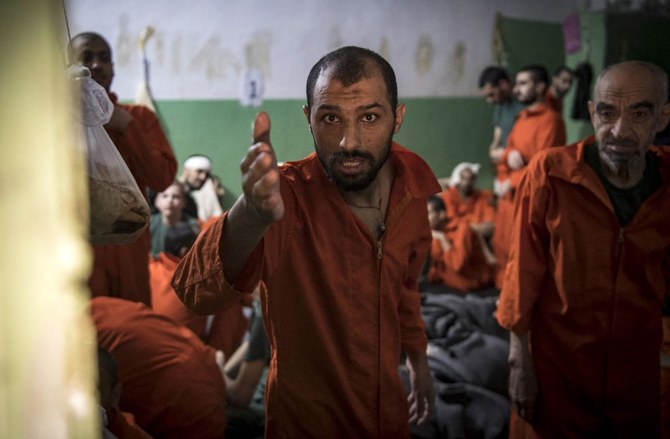
- The brazen Daesh operation sewed chaos in Hasakah, forcing people to flee the area around Ghwayran prison
- The attack marked the jihadists’ deadliest operation in Iraq this year
US says a UN agency has agreed to help in distribution of aid to Gaza via sea route

- US officials say they were working with WFP on how to deliver the aid to Palestinian civilians “in an independent, neutral, and impartial manner”
- The NGO group World Central Kitchen stopped its aid distribution work after an Israeli attack killed seven aid workers on April 1
WASHINGTON: The UN World Food Program has agreed to help deliver aid for the starving civilians of Gaza once the US military completes a pier for transporting the humanitarian assistance by sea, US officials said Friday.
The involvement of the UN agency could help resolve one of the major obstacles facing the US-planned project — the reluctance of aid groups to handle on-the-ground distribution of food and other badly needed goods in Gaza absent significant changes by Israel.
An Israeli military attack April 1 that killed seven aid workers from the World Central Kitchen intensified international criticism of Israel for failing to provide security for humanitarian workers or allow adequate amounts of aid across its land borders.
President Joe Biden, himself facing criticism over the humanitarian crisis in Gaza while supporting Israel’s military campaign against Hamas, announced March 8 that the US military would build the temporary pier and causeway, as an alternative to the land routes.
The US Agency for International Development confirmed to The Associated Press that it would partner with the WFP on delivering humanitarian assistance to Gaza via the maritime corridor.
“This is a complex operation that requires coordination between many partners, and our conversations are ongoing. Throughout Gaza, the safety and security of humanitarian actors is critical to the delivery of assistance, and we continue to advocate for measures that will give humanitarians greater assurances,” USAID said in its statement to the AP.
US and WFP officials were working on how to deliver the aid to Palestinian civilians “in an independent, neutral, and impartial manner,” the agency said.
There was no immediate comment from the WFP, and an WFP spokesperson did not immediately return a request for comment.
Israel promised to open more border crossings into Gaza and increase the flow of aid after its drone strikes killed the seven aid workers, who were delivering food into the Palestinian territory.

The war was sparked when Hamas militants attacked southern Israel on Oct. 7, killing about 1,200 people and taking some 250 others hostage. The Israeli offensive in Gaza, aimed at destroying Hamas, has caused widespread devastation and killed over 33,800 people, according to local health officials. Hundreds of UN and other humanitarian workers are among those killed by Israeli strikes.
International officials say famine is imminent in northern Gaza, where 70 percent of people are experiencing catastrophic hunger.
The US military will be constructing what’s known as a modular causeway as part of the maritime route, in hopes that handling the inspection and processing of the aid offshore will speed the distribution to Gaza’s people.
Offshore, the Army will build a large floating platform where ships can unload pallets of aid. Then the aid will be transferred by Army boats to a motorized string of steel pier or causeway sections that will be anchored to the shore.
Several Army vessels and Miliary Sealift Command ships are already in the Mediterranean Sea, and are working to prepare and build the platform and pier.
That pier is expected to be as much as 1,800 feet (550 meters) long, with two lanes, and the Pentagon has said it could accommodate the delivery of more than 2 million meals a day for Gaza residents.
Army Col. Sam Miller, commander of the 7th Transportation Brigade, which is in charge of building the pier, said about 500 of his soldiers will participate in the mission. All together, Pentagon officials have said about 1,000 US troops will be involved.
Air Force Maj. Gen. Pat Ryder, Pentagon press secretary, told reporters this week that the US in on track to have the system in place by the end of the month or early May. The actual construction of the pier had been on hold as US and international officials hammered out agreements for the collection and distribution of the aid.
He said the US has been making progress, and that Israel has agreed to provide security on the shore. The White House has made clear that there will be no US troops on the ground in Gaza, so while they will be constructing elements of the pier they will not transport aid onto the shore.
US Navy ships and the Army vessels will provide security for US forces building the pier.
Hamas chief Haniyeh arrives in Turkiye for talks
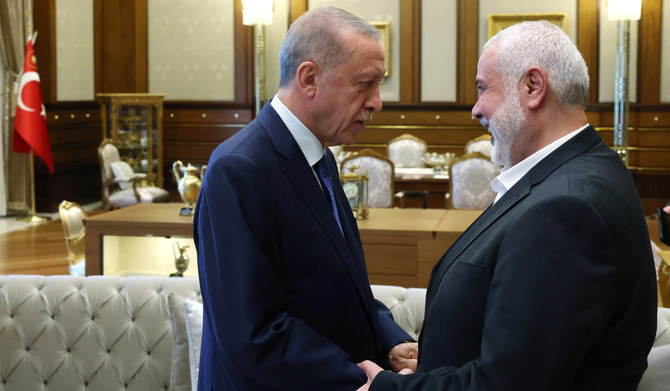
- Fidan said he spoke with Haniyeh, who lives in Qatar, about how Hamas — designated as a terrorist organization by Israel, the United States and the European Union — “must clearly express its expectations, especially about a two-state solution”
ISTANBUL: A leader of Palestinian militant group Hamas, Ismail Haniyeh, arrived in Istanbul Friday evening for talks with Turkish President Recep Tayyip Erdogan as the death toll in Gaza passed 34,000.
A statement from Hamas Friday said Erdogan and Haniyeh would discuss the conflict in Gaza, adding that the head of the group’s political bureau was accompanied by a delegation.
Middle East tensions are at a high after Israel’s reported attack on Iran and Gaza bracing for a new Israeli offensive.
Erdogan insisted on Wednesday that he would continue “to defend the Palestinian struggle and to be the voice of the oppressed Palestinian people.”
But talking to journalists on Friday, he refused to be drawn on the details on the meeting.
Turkish Foreign Minister Hakan Fidan was in Qatar Wednesday and said he spent three hours with Haniyeh and his aides for “a wide exchange of views in particular about negotiations for a ceasefire.”
Qatar, a mediator between Israel and Hamas, acknowledged Wednesday that negotiations to end hostilities in Gaza and liberate hostages were “stalling.”
Fidan said he spoke with Haniyeh, who lives in Qatar, about how Hamas — designated as a terrorist organization by Israel, the United States and the European Union — “must clearly express its expectations, especially about a two-state solution.”
Erdogan’s last meeting with Haniyeh was in July 2023 when Erdogan hosted him and Palestinian president Mahmud Abbas at the presidential palace in Ankara. Haniyeh had last met Fidan in Turkiye on January 2.
The war in Gaza started after Hamas’s unprecedented attack on Israel on October 7 that resulted in the deaths of about 1,170 people, mainly civilians, according to an AFP tally of official Israeli figures.
Militants also took about 250 hostages. Israel says around 129 are believed to be held in Gaza, including 34 presumed dead.
Israel’s retaliatory military campaign has killed at least 34,012 people, mostly women and children, according to Gaza’s Hamas-run health ministry.
Huge blast at military base used by Iraqi Popular Mobilization Forces, sources say

- PMF sources said the strikes targeted a headquarters of the PMF at the Kalso military base near the town of Iskandariya around 50 km south of Baghdad
BAGHDAD: A huge blast rocked a military base used by Iraq’s Popular Mobilization Forces (PMF) to the south of Baghdad late on Friday, two PMF and two security sources told Reuters.
The two security sources said the blast was a result of an unknown airstrike, which happened around midnight Friday.
The two PMF sources pointed out the strikes did not lead to casualties but caused material damage.
PMF sources said the strikes targeted a headquarters of the PMF at the Kalso military base near the town of Iskandariya around 50 km south of Baghdad.
Government officials did not immediately respond to a Reuters request for comment.
The PMF started out as a grouping of armed factions, many close to Iran, that was later recognized as a formal security force by Iraqi authorities.
Factions within the PMF took part in months of rocket and drone attacks on US forces in Iraq amid Israel’s Gaza campaign but ceased to do so in February.
Leaders of Jordan and Pakistan call UAE president to express concern about effects of severe storm

- Leaders passed on their best wishes to the country as it recovers from the storms
DUBAI: The president of the UAE, Sheikh Mohammed bin Zayed Al-Nahyan, received telephone calls from King Abdullah of Jordan and Pakistan’s Prime Minister Shehbaz Sharif on Friday, during which they expressed concern about the effects of the severe weather, including unusually heavy rainfall, that battered parts of the country this week.
They also passed on their best wishes to the country as it recovers from the storms and “conveyed their heartfelt hopes for the safety and prosperity of the UAE and its people, praying for their protection from any harm,” the Emirates News Agency reported.
Sheikh Mohammed thanked both leaders for their warm sentiments, and emphasized the strong bonds between the UAE and their nations.
The UAE and neighboring Oman were hit by unprecedented rainfall and flooding on Tuesday, with more than 250 millimeters of rain falling in parts of the Emirates, considerably more than is normally seen in a year. Dubai International Airport was forced to close temporarily when runways were flooded.
Peshmerga fighter dies in Turkish strike in north Iraq

JEDDAH: A member of the Kurdish Peshmerga security forces was killed on Friday in a Turkish drone strike in the autonomous Kurdistan region of northern Iraq.
Ankara regularly carries out ground and air operations in the region against positions of the outlawed PKK, the Kurdish separatist group that has waged a decades-long insurgency against the Turkish state.
The victim of Friday’s attack died in a drone strike on his vehicle, said Ihsan Chalabi, mayor of the mountainous Sidakan district near Iraq’s borders with Turkiye and Iran.
For decades, Turkiye has operated several dozen military bases in northern Iraq in its war against the PKK, which Ankara and its Western allies consider a terrorist group.
Both Baghdad and the Kurdish regional government have been accused of tolerating Turkiye’s military activities to preserve their close economic ties.
At the beginning of April, a man described as “high-ranking military official” from the PKK was killed in a Turkish drone strike on a car in the mountainous Sinjar region, according to the Kurdistan counterterrorism services.
Turkish President Recep Tayyip Erdogan is expected to visit Baghdad on Monday on his first official visit to Iraq since 2011.
Iraq’s Defense Minister Thabet Al-Abassi in March ruled out joint military operations against the PKK, but said that Turkiye and Iraq would “work to set up a joint intelligence coordination center.”



